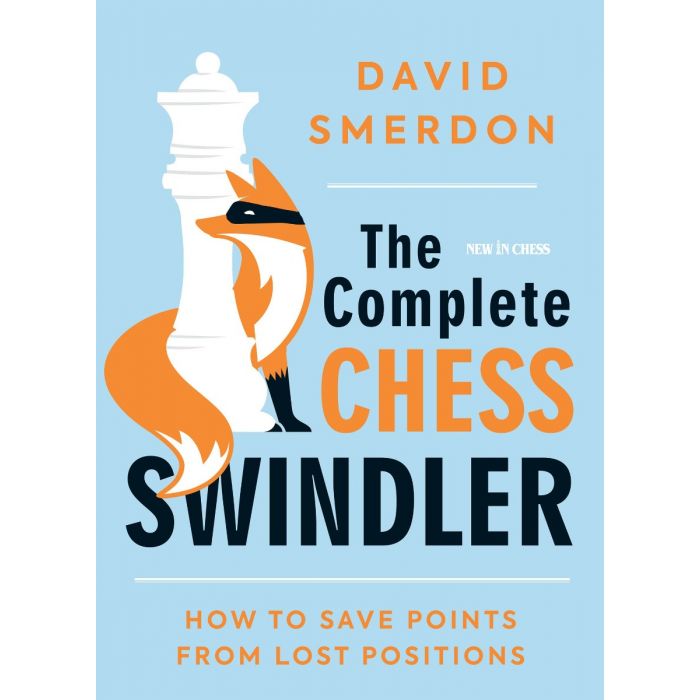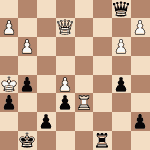The Complete Chess Swindler: How to Save Points from Lost Positions won the 2020 English Chess Federation Book of the Year Award. The book is by Grandmaster David Smerdon, who later created a Chessable course based on the book.
Who falls for swindles?

Smerdon lists “Four Flaws of the Chess Psyche” which every player may be susceptible to during any given game. The four flaws are Impatience, Hubris, Fear, and Kontrollzwang. If you exhibit one or more of these flaws, you could get swindled.
Here are Smerdon’s definitions of the first two flaws. Impatience is “the desire to finish off a game as quickly as possible.” Hubris is “extreme, almost haughty self-belief” which may lead to over-confidence. Smerdon adds, “one gender difference for which there is strong academic evidence is that men are on average more prone to overconfidence than women.”
Resign Already!
In 2003 I co-authored a Chess Life article titled “Resign Already!” with then UT Dallas chess team member Andrew Whatley. At the time, my US Chess rating was 2000. That was, and is, my “floor” because, in 1992, I reached a peak rating of 2260. One’s US Chess floor is 200 points below one’s peak, then rounded down to the nearest 100. I wrote:
In the 2003 U.S. Amateur Team East, I won a rook against a 1600 player. As my opponent continued making moves, a series of annoyed thoughts crossed my mind. Some were egotistical (“Doesn’t he know he is playing a former U.S. Women’s Chess Champion? I know how to win a rook up. This is ridiculous.”), and some focused on the victory ahead (“I can finally go eat with my teammates. We will have at least three wins in this match.”)
Following Smerdon’s “four flaws,” the last part of my quote shows the flaw of impatience. I wanted to go eat! My teammates were waiting for me! The first part of my quote shows what Smerdon might call the flaw of hubris. I am a woman, but perhaps I exhibited what Smerdon mentions is a more typically male trait of overconfidence.
However, I won that game. I was completely winning it. Maybe this man played on longer because I am a woman. One research study found that “men persist longer before losing to women.” Does that study mean that women may be more susceptible to swindles, because they are stuck playing longer games?
There is the old saying, “No one ever won a game by resigning.” If you don’t resign, some of your losing positions will evolve into endgames.
Endgame Swindles
Smerdon writes, “Statistically, the majority of swindles occur in the endgame.” The first endgame he lists, for its swindling possibilities, is king, bishop, and knight versus king. According to Smerdon, databases have “ten games played by grandmasters, and one by a reigning Women’s World Champion” where those titled players did not win with the bishop and knight. Like their opponents, you may be able swindle a draw with your lone king. Basic plan: Head to the corner of the opposite color of your opponent’s bishop. To learn how to win when you have the bishop and knight, read this SparkChess article.
The second of Smerdon’s swindle-likely endgames is rook and bishop versus rook, which I wrote about in a previous SparkChess article. In the game featured in that article, Magnus Carlsen had the rook and bishop and won against Alireza Firouzja, who had the rook.
One example of king, rook, and bishop versus king and rook in Smerdon’s book is Pouria Darini versus Parham Maghsoodloo. Smerdon’s header gives the game’s location as “Teheran.” (That city is more commonly spelled as “Tehran.”) White (Darini) had the king, rook, and bishop, while Black (Maghsoodloo) had the rook. Black plays a beautiful drawing idea on move 104.
If White captures Black’s rook on g5, the game is drawn by stalemate. If White moves his rook to g3 or g2—or moves his king to f3 or g3 or moves his bishop—Black trades rooks because king and bishop versus king is a draw. If White moves his rook to h4 to give a check, then Black blocks the check with his rook and the position will repeat if White puts his rook back on g4.
Recommended
The Complete Chess Swindler: How to Save Points from Lost Positions is entertaining. The swindles are spectacular and the stories introducing them are funny. Reading Smerdon’s book is like watching movies with kidnapping, intrigue, and gunfights but with humor too, like Rush Hour or Shanghai Noon.
Where to Buy
The Complete Chess Swindler: How to Save Points from Lost Positions is published by New in Chess and is available at the publisher’s website as well as at online retailers. The Chessable course is available at this link.
